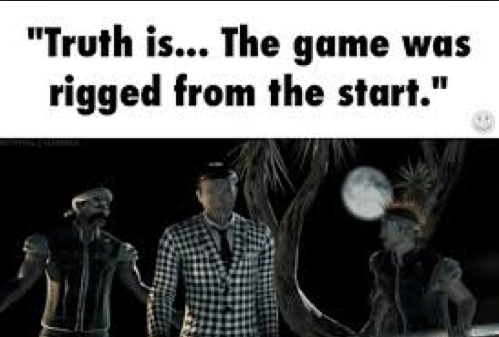Crypto Market Commentary
14 April 2020

Doc's Daily Commentary
The 1 April ReadySetLive session with Doc and Mav is listed below.

Mind Of Mav
A Post-Truth World: The Breakdown Of The Modern Mind Pt. 1
What is unique about the 2006 dystopian film Children of Men is that it is specific to late capitalism.
This isn’t the familiar totalitarian scenario routinely trotted out in cinematic dystopias (see, for example, James McTeigue’s 2005 V for Vendetta). For all that we know, the authoritarian measures that are everywhere in place could have been implemented within a political structure that remains, notionally, “democratic”. The War on Terror has prepared us for such a development: the normalization of crisis produces a situation in which the repealing of measures brought in to deal with an emergency becomes unimaginable (“When will the war be over?”, became, “when will the pandemic end?”).
Watching Children of Men, we are inevitably reminded of the phrase attributed to philosopher Slavoj Žižek, “it is easier to imagine the end of the world than it is to imagine the end of capitalism.”
What’s also striking is how the catastrophe in Children of Men is neither waiting down the road, nor has it already happened. Rather, it is being lived through. There is no punctual moment of disaster; the world doesn’t end with a bang, it winks out, unravels, gradually falls apart. What caused the catastrophe to occur, who knows; its cause lies long in the past, so absolutely detached from the present. Such a blight can only be eased by an intervention that can no more be anticipated than was the onset of the curse in the first place.
Sure, the parallels are there, but I don’t bring this up to bore you with my hedonistic nihilism.
What we need to realize is that we are not just dealing with a pandemic and economic crisis. We are dealing with a crisis of meaning, truth, and trust.
We need to look to the present as a great mirror: the darkness we see is simply the absence of light.
The long, dark night of the end of history has to be grasped as an enormous opportunity. The very oppressive pervasiveness of a dysfunctional status quo means that even glimmers of alternative political and economic possibilities can have a disproportionately great effect. The tiniest event (or microbe?) can tear a hole in the grey curtain of reaction which has marked the horizons of possibility under modern society. From a situation in which nothing can happen, suddenly anything is possible again.
We are dealing with a crisis of meaning, trust, and truth. Let’s first address truth.
In part, we can see this reflected in the ‘post-truth’ condition of discourse — after all, ‘post-truth’ was declared word of the year for 2016 by the Oxford English Dictionary, defining it as:

Relating to or denoting circumstances in which objective facts are less influential in shaping public opinion than appeals to emotion and personal belief: ‘in this era of post-truth politics, it’s easy to cherry-pick data and come to whatever conclusion you desire’
In an ultimate sense of irony, this is a post-truth definition of ‘post-truth’. It is how those dominant in the relevant knowledge-and-power game want their opponents to be seen. In this context, the word ‘emotion’ is a bit of post-truth jargon that only serves to obscure the word’s true function, which is to gain competitive advantage in some more or less well-defined field of play.
After all, it was Plato who realized that the only way to curb democracy’s chaotic tendencies was to ensure that discussions about the rules of the game and one’s position in the game are kept separate – what logicians have respectively called ‘first-order’ and ‘second-order’ questions.
We can debate one or the other but not both at once. That is the ‘truth condition’.
Conversely, the ‘post-truth condition’ challenges that assumption, as players jockey for position in the current game, while at the same they try to change the rules so as to maximize their own overall advantage.
No wonder people are frustrated; they know the game has been rigged while being told it’s not.

One need not pronounce on the specific fates of, say, Brexit or Trump to see that the post-truth condition is here to stay. The post-truth disrespect for established authority is ultimately offset by its conceptual openness to previously ignored people and their ideas.
They are encouraged to come to the fore and prove themselves on this expanded field of play. In this respect the post-truth condition marks a triumph of democracy over elitism, albeit one that potentially tilts the balance towards ‘chaos’ over ‘order’.
To me, this represents the central fulcrums of our time: how do you define truth and trust in a digital age? How can we possibly ascertain what is objectively true or false when we are barraged with a firehouse of information every single day, especially when many of those who demand our attention (politicians, media, advertisers, etc.) also play to our underlying emotional triggers?
This has eroded the trust that holds our society together.
Tomorrow we’ll talk more about that erosion of trust and how it is causing a crisis of meaning.
Press the "Connect" Button Below to Join Our Discord Community!
Please DM us with your email address if you are a full OMNIA member and want to be given full Discord privileges.
An Update Regarding Our Portfolio
RSC Subscribers,
We are pleased to share with you our Community Portfolio V3!

Add your own voice to our portfolio by clicking here.
We intend on this portfolio being balanced between the Three Pillars of the Token Economy & Interchain:
Crypto, STOs, and DeFi projects
We will also make a concerted effort to draw from community involvement and make this portfolio community driven.
Here’s our past portfolios for reference:
RSC Managed Portfolio (V1)

